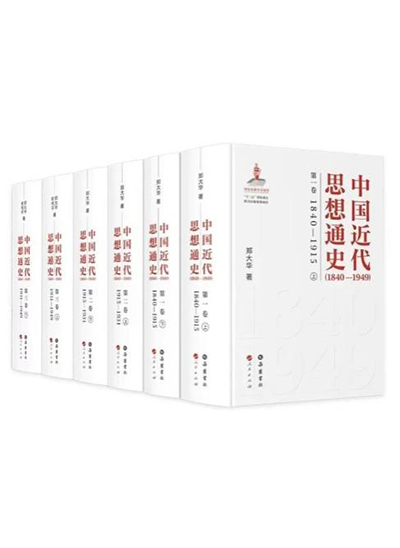An intellectual history of national rejuvenation

A General History of Modern Chinese Thought (1840–1949)
A General History of Modern Chinese Thought (1840–1949), by Zheng Dahua, a research fellow from the Institute of Modern History at the Chinese Academy of Social Sciences, examines the diverse thoughts, concepts, and propositions that advocated for “opposing imperialism to pursue national independence and opposing feudalism to win social progress” since modern times. By examining these themes, this comprehensive history of thought effectively serves as a chronicle of the intellectual journey toward the rejuvenation of the Chinese nation.
Zheng’s work traces the trajectory from the social crisis and the revival of pragmatism between the Jiaqing and Daoguang eras in the Qing Dynasty (1644–1911) to the CPC’s scheme to establish a new China after the civil war against Kuomintang [KMT]. It covers a variety of resistance ideologies, such as the ideal order envisioned by the Taiping Rebellion, the anti-aggression sentiments of the Boxer Rebellion, the democratic revolutionary ideas of the late Qing revolutionaries, and the influence of the Communist International during the Republic of China (1912–49) era. Additionally, the book touches on various constructive ideologies, such as the Westernization movement of the 1960s to the 1990s, reformist trends at the end of the 19th century, the New Culture Movement in the early Republican era, the political ideologies of the Great Revolution, the call for resistance against Japanese aggression for national construction during the War of Resistance Against Japanese Aggression, and the debates over state-building theory during the CPC-KMT civil war. Nearly all topics of academic concern are subjected to detailed discussion and analysis in this work.
Zheng’s analysis is grounded in a multitude of reliable modern historical sources, including representative newspapers, periodicals, individual collections, letters, memoirs, and archives from the Qing Dynasty and the Republic of China, showcasing the author’s profound scholarly expertise.
Typically, works on modern Chinese intellectual history divide the subject by major historical markers such as the First Opium War, the May Fourth Movement, and the founding of the PRC. The book, however, makes a significant departure by proposing a unique periodization approach based on the characteristics of intellectual history itself. It begins its narrative before the First Opium War, during the Jiaqing and Daoguang periods. According to the historical resultant theory, in addition to the stimulus of imperialist aggression, the intellectual foundations for modernity in China were already being laid within Chinese society. The turning points are identified as the New Culture Movement that began in 1915 and the September 18 Incident that broke out in 1931. This distinctive periodization reflects Zheng’s unique understanding of the trajectory of modern Chinese thought. As such, these specific turning points are given particular emphasis in the book, with multiple chapters dedicated to each. These sections represent areas of the author’s most dedicated expertise.
He Zhuo’en is a professor from the Institute of Modern Chinese History at Central China Normal University.
Edited by YANG LANLAN

 PRINT
PRINT CLOSE
CLOSE